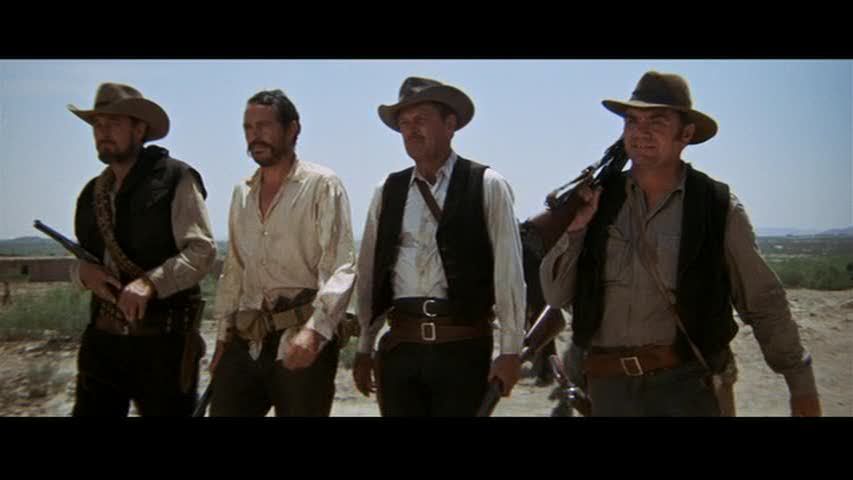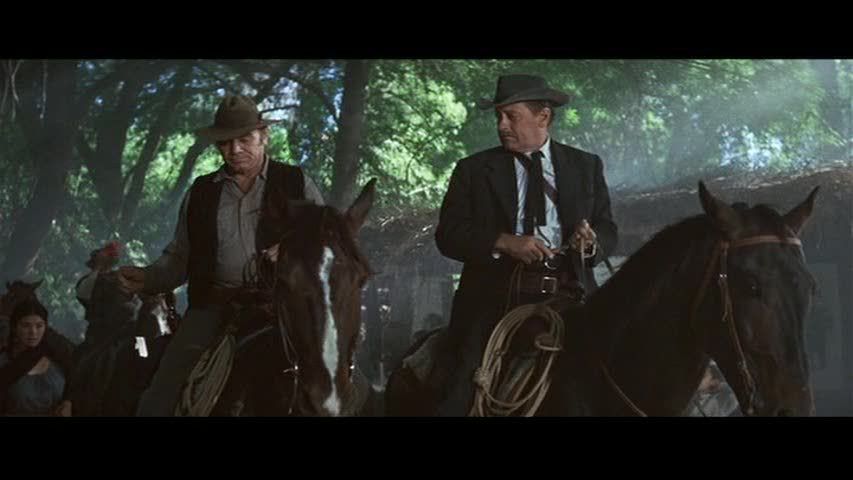
The Wild Bunch is a brutish, nasty, ugly movie, a film that aims to strip the Western genre of its stereotypes and clichés and instead strips it of its humanity, of any trace of true honor or decency or goodness. The film certainly strips the varnish off of great Western archetypes like the honorable outlaw or the decent lawman on his trail, but it doesn't replace the absence with anything: it's just a big gaping hole that goes unfilled. As such, the film is an unremittingly unpleasant experience, watching rotten people do rotten things to one another, with one band of these rotten people placed in the central position usually reserved for the heroes in these kinds of movies. There's a lot of shrill laughter, but very little true humor: just these men making one another the butt of cruel jokes.
It's certainly hard to work up much sympathy for the gang of bank robbers and bandits led by aging tough guy Pike Bishop (William Holden). Joined by his friend Dutch Engstrom (Ernest Borgnine), the rowdy, womanizing Gorch brothers (Warren Oates and Ben Johnson), the proud Mexican youth Angel (Jaime Sánchez) and the withered old coot Sykes (Edmond O'Brien), Pike and his gang have become the most wanted men in Texas. They're hunted by a band of bounty hunters led by Pike's former partner Deke Thornton (Robert Ryan), who has no choice but to hunt down his old friend or else be sent back to prison. The bounty hunters are portrayed as a gaggle of cackling vultures, hooting and hollering whenever they come across a corpse, picking at the boots and weapons and gold left behind. These filthy, stupid, nasty men are so thoroughly amoral that Pike and Deke actually begin to seem almost honorable in comparison, almost like the good guys by default, just because there's no one else available who could possibly fill that vacuum.
In fact, though the outlaws claim to have a code of honor, to be bound together by their promises and commitments to one another, there's little honor to their actual behavior. They stop just short of killing one another, but that seems to be just about their only limit. They're hard men, doing anything for some gold, not above leaving one of their own to die and thinking very little of it. When one of the men learns that his grandson has been killed, he shrugs and just wants to know if the boy acquitted himself with honor — a laughable premise since the kid was a typically brutish thug who died while abusing and threatening a group of hostages. Pike and his gang are deluding themselves with their talk of honor and loyalty, of being bound together as a group, as though there's something noble in what they're doing. At one point, Pike talks about doing one last job and then pulling back, the oldest of clichés for Western outlaws getting old, but Dutch quickly puts things in perspective: "pull back to what?" These men have nothing beyond the hard, cold lives they've made for themselves, nothing to look forward to beyond the next gold score and the whores and booze it can buy for them.

Director Sam Peckinpah signals right from the very beginning what kind of a movie this is going to be. As Pike and his men ride into town, dressed as soldiers to rob a bank, they pass by a group of kids by the side of the road, playing with a pair of trapped scorpions being overrun by swarming red ants. The symbolism is obvious, and hints forward all the way to the film's conclusion: a few deadly, dangerous creatures being destroyed, eventually, by the less powerful but more numerous hordes surrounding them. Throughout the film, children frequently appear, as images of lost innocence for Pike, who is, with Deke, alone among these men in seeming to have some regret about what he's become. The laughing faces of children thus often appear as symbols of innocence, but just as often it's apparent that children can be taught to torture, to kill, to serve as soldiers: the innocence Pike seems to remember and cherish is very fragile indeed, easily overcome by a cruel world. On the way out of town, after the failed bank job, Pike and his men pass by the kids again, to see them growing bored of the contest between the scorpions and the ants; the kids cover the whole ground with straw and light it afire.
These opening scenes establish the elemental themes of the film to come, particularly in the disastrous bank heist, which backfires when Deke and his bounty hunters are waiting in ambush. In the resulting melee, the two groups of killers shoot up the town, and it's not clear who takes more innocent lives caught in the crossfire, the bandits or the men supposedly working on the side of the law. The streets are soon filled with blood, bright red and blatantly artificial blood, each bullet smearing a big red circle on anyone it hits. After this frenetic shootout, the pace of the film slows down, and the middle section is languid and episodic, following the disappointed bandits as they meander around, trying to plan their next heist while evading capture.
They spend some time in Angel's poor Mexican village, where he is outraged to find that in his absence, Mexican federal troops have stormed the village, killing his father and stealing his lover away as the woman of the general Mapache (Emilio Fernández). Angel is the only character in the film who has some sense of nobility, who wants something beyond himself: freedom from tyranny for his people. The film's middle section drags, though, mainly because Peckinpah seems very interested in capturing the milieu of his characters, but not in delving any deeper into them as characters. Pike gets a few very brief flashbacks, fading in and out over closeups of his face, but neither him nor any of the other characters could really be said to have much complexity or nuance. The closest the film comes to deeper characterization is the blank stares of Pike whenever he's in an ugly situation, like the excruciatingly long sequence toward the end where Pike sits uncomfortably staring at the prostitute he'd just spent the night with, as her baby cries in the background. In overthrowing old archetypes, Peckinpah only replaced them with new ones, crude and ugly archetypes biding time until they next bathe in blood. The film picks up again when the group decides to rob a munitions train and escapes with both Deke's hunters and the US Army on their trail. But no matter how viscerally exciting the film's action set pieces often are, it's hard to escape the overwhelming impression of this film as wallowing, without relief, in dirt and blood and ugly emotions.







0Awesome Comments!